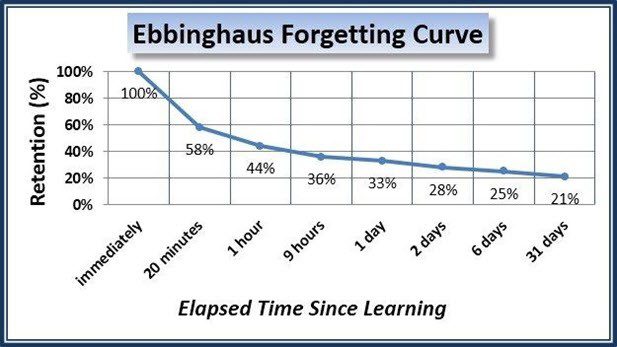Are you wasting your time attending leadership development conferences?
German psychologist Hermann Ebbinghaus devised several experiments (130 years ago) to measure how fast we forget. He concluded the majority of information we hear is forgotten within one hour, and 75% disappears in a week.

To be sure, his simplified conclusion doesn’t take into account varied teaching methods, experiential learning strategies, or learning styles. Not all educational strategies are created equal. But it raises the question: Do leadership conferences leave a lasting impact after a couple days of talks?
In my role as a philanthropy advisor, I’m asked all the time to direct clients’ charitable giving toward the next great conference: Social Impact conferences, conferences for pastors, youth conferences, business leader conferences, and conferences for youth pastors mobilizing business leaders to create social impact (OK, not the last one).
The typical value proposition is: thousands of people will be impacted! But I’m skeptical. Attendance does not equal impact. More “butts in seats” is not more effective. It may reflect the marketing and production value more than personal transformation. People attend conferences for countless reasons: funny speakers, social pressure, résumé-building, a free meal.
So how can you know if a leadership conference is worth your time when marketing buzz and big attendance aren’t reliable indicators?
How Do You Measure Outcomes for Leadership Conferences?
In 2014, our philanthropic advising firm Excellence in Giving started a 14-month process of evaluating outcomes from a leadership conference our clients support. The Global Leadership Summit (GLS) is the Willow Creek Association’s flagship event, a two-day global conference that has grown over the past 20 years to 260,000 annual participants in 875 cities. We wanted to know what kind of impact the GLS has had during its rapid growth.
How did we set up an outcomes measurement process? We evaluated and categorized impact themes from over 1,000 written testimonies. We turned qualitative research from focus groups into a quantitative survey instrument. We validated the instrument with a random sample of GLS participants from 2013. Then we administered the survey to 3,750 participants in the USA two months after the August 2014 Summit. We tracked a dozen impact variables to move beyond the simple question “Does it work?” to “Why does it work?” The sample size gave us a 99% confidence level in the results with a 3% margin of error.
Here is what we learned.
The Global Leadership Summit’s Lasting Impact
We sliced the data based on leadership experience, age, sector, organization size, and number of times at the Summit. First-time participants reported how GLS “inspired” them to take action. Repeat participants provided concrete details about the impact of past actions. Here is what participants said they had done because of inspiration from the Summit:
- Persevere. 1 out of 10 participants did NOT quit leading.
- Multiply. 65% use GLS materials to train 34 other leaders each year.
- Unite. 1 out of 5 decided “to collaborate with a new group or leader for the first time.”
- Lead. 81% of the 55% who had a supervisor attend GLS cited concrete ways the supervisor leads better now.
- Serve. 54% cited concrete ways they impacted their community.
- Give. 27% of business leaders were inspired to financially support community service organizations at an average $10,468 per person in the past two years for an estimated total $18.8 million in the past year.
- Evangelize. 23% of church leaders were inspired to evangelize with an average 54 first-time commitments for an estimated total 70,466 first-time commitments in the past year.
- Experience God. 1 out of 3 reported a “revitalized relationship with God.”
The Willow Creek Association turned these highlights into effective marketing efforts in 2015. Willow Creek lead pastor Bill Hybels quoted the survey results in the 2015 Global Leadership Summit promotional video. But that only tells half the story.

Hidden Success Factor
Measuring outcomes should show you how to improve, not just produce, highlights for external marketing. So what did we learn about key variables affecting the impact of the Global Leadership Summit?
The answer is simple: The greatest impact of the Summit doesn’t happen at the Summit. Year-round engagement in personal leadership development determines the lasting value. Leaders who (1) read the speaker’s books, (2) watch the sessions again, and (3) work with a mentor (4) to apply leadership principles report a 154% increase in seven key outcomes compared to all other participants. That’s 154% more community impact, collaboration, organizational growth, training other leaders, perseverance in leadership positions, new leadership positions, and clarity of vision. What does that mean? Year-round personal leadership development is the hidden success factor. The Summit catalyzes growth by curating great leadership coaches for highly motivated leaders.
You can’t just show up to the Summit for a couple days and think the magic happened. Only 15% link organizational growth to the Summit when they just attend, but 50% see growth when they do ALL four follow-up actions listed above. The same 3x growth happens for starting new collaborations and new leadership positions. That’s why the Global Leadership Summit launched the GLSNext App. Willow Creek knows year-round engagement is the pivotal factor for getting results so they built a platform to do just that.
Not a Panacea for Every Participant
Now the positive impact isn’t experienced universally. The data is more tempered than that. The design of the survey wasn’t to create a false sense of 100% success. The survey questions were intentionally structured to facilitate negative feedback in a disarming manner. Each impact area was assessed through two to three questions designed to validate or invalidate responses. The top three and bottom three outliers were eliminated for each set of numerical responses to create a clearer picture of the common experience.
Here is the reality check on the other side of really positive results:
- Little organizational growth.73% did not see the size of their organization grow because of GLS leadership skills, inspiration, or vision.
- Large churches not motivated to evangelize.More than 80% of leaders from large churches are not energized to do more evangelism.
- Large companies without new direction.Less than half the leaders from large companies get clarity of vision.
- Few meaningful connections.4 out of 5 leaders don’t start new collaborative relationships.
- Low spiritual impact.2 out of 3 participants did not revitalize their relationship with God.
The Global Leadership Summit is a one-stop shop for leaders from every sector. But not every leader benefits in the same ways, or at all. There is no guarantee you will be in the 70% who learn leadership principles to apply afterwards or the 30% who do nothing with what they heard.
Should You Attend the Next Conference?
The Ebbinghaus forgetting curve concludes that 80% of what you learn is lost in a month. The outcomes data from the Summit suggests you can buck the trend. But the secret sauce is year-round personal leadership development.
Highly motivated leaders do learn from the Summit’s curated line-up of leadership exemplars. The recipe works. 83% of participants have other “local leadership development resources” but choose to attend the Summit. Of the 61% who had a supervisor attend previously, 81% could cite concrete ways their supervisor improved. For those participants, the Global Leadership Summit has lasting value that benefits their lives every day.
The results of the Summit will not apply to all leadership development conferences. Most conferences don’t motivate and facilitate such year-round engagement with best-in-class leadership development coaches and resources. Many do not even attract enough long-term repeat participants to track what is working and what is not. Too many offer leadership training to people who don’t lead anything.
So how do you judge if a leadership conference is worth your time? Assess outcomes. Program quality can be quantified. Valid data can reveal strengths and weaknesses. It’s worth the investment for nonprofits to understand how to maximize the next event. Conferences should make “improvements” based on data trends not by gut and guess. Then we should all be able to review the outcomes and impact variables to see which training model suits us. Every participant will win when conferences get better. So measure better.






Really interesting and helpful post, Paul. It’s so true that we often plan conferences by gut and guess, rather than assessing the actual impact and outcomes. This will be on my mind the next time I help lead a conference! Also, I attended the GLS this year. I’m not surprised that their consistent quality is largely due to their process that you outlined, and their willingness to learn and change. Thanks.